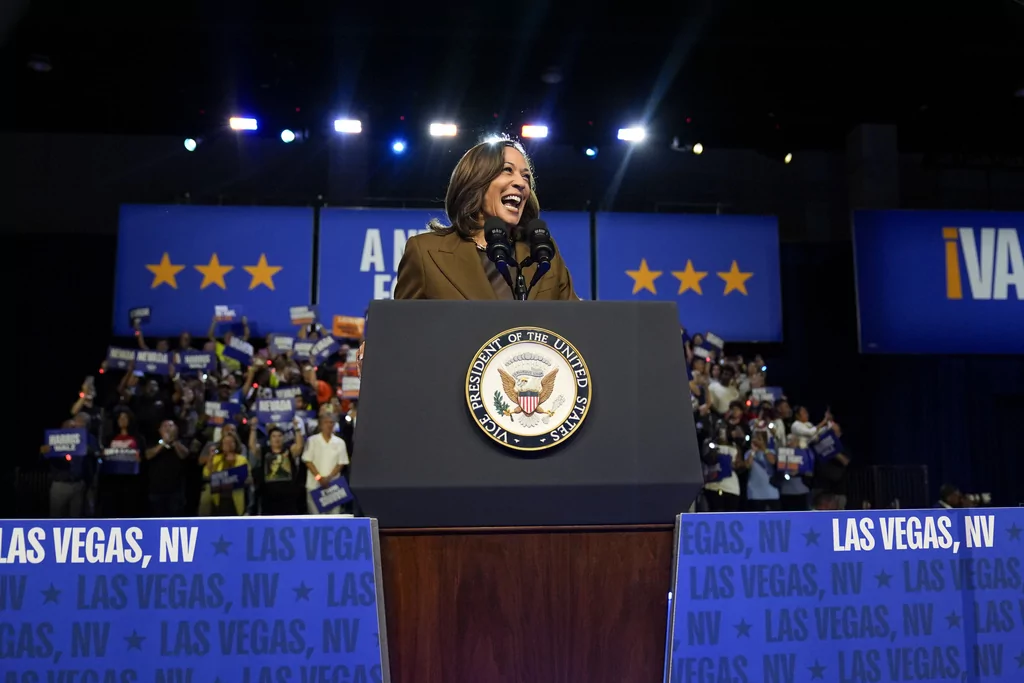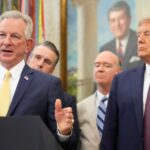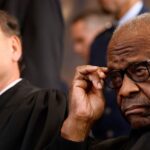

Vice President Kamala Harris dodged a significant problem this week after the Biden administration helped negotiate a deal that delayed the historic United States port strike until after the 2024 election.
Some strategists believe the delayed strike will boost Harris’s campaign. Numerous polls show she is closing the gap between herself and former President Donald Trump over who is better equipped to handle the economy—particularly after a report dropped Friday showing job growth exceeding expectations.
“This is a great weekend for Harris … because of the dock strike, which could have exacerbated supply and inflation problems, and the big growth in jobs. So, you know, I think the Harris campaign has good reason to celebrate,” Democratic strategist Brad Bannon told the Washington Examiner.
The strike, now delayed until Jan. 15, takes a potentially disastrous campaign problem off the table for Harris, particularly as she struggles to reach swing voters on top 2024 matters, such as immigration and the war in the Middle East.
Peter Loge, political scientist and director of the School of Media and Public Affairs at George Washington University, told the Washington Examiner the ending of the strike is good for Harris because it’s “one less thing to talk about,” and it would “create an opening for Trump.”
“The Trump campaign is saying, in the face of chaos and uncertainty, you need a firm, resolute leader,” Loge said. “The less chaos, the less uncertainty, the better for Harris-Walz. Avoiding a strike takes a bit of chaos and uncertainty off of the table.”
Biden administration navigates deal ahead of 2024 election
Biden made his first briefing room appearance Friday since taking office, praising the negotiations and tentative agreement made by the International Longshoremen’s Association and United States Maritime Alliance the day prior.
“We averted what could have become a major crisis for the country,” Biden said.
“I especially want to thank the carriers, the port operators, and the longshoremen union for reaching this agreement at a time when the nation has experienced such terrible devastation from Hurricane Helene,” he added. “It was truly a service to the American people for all these parties to come together and respond to our request to keep the ports open.”
Sources close to the president told the Washington Examiner that White House officials began taking a direct interest in the negotiating process in early September, suggesting that Biden himself was personally involved in the administration’s efforts from Sept. 26 to Oct. 3.
Those sources gave the Washington Examiner a detailed, day-by-day recounting of the administration’s efforts to avoid, and eventually end, the ILA strike, including five specific meetings between the president’s Cabinet and senior representatives of the carriers, during which the administration pressured USMX to meet ILA’s wage increase demands.
The month opened with chief of staff Jeff Zients holding weekly meetings with National Economic Council Director Lael Brainard, acting Labor Secretary Julie Su, and Transportation Secretary Pete Buttigieg to understand the “lay of the land” and strategize how to bring both parties to the table.
Those convenings progressed into daily outreach to USMX and ILA by the president’s Cabinet in hopes of avoiding major work stoppages.
As it became clear that neither USMX nor ILA planned on being the first to broach negotiations, Biden himself met with that team on Sept. 26 and directed them to reach out to both parties on his behalf to speed the process along.
The following day, Brainard, Su, and Buttigieg hosted USMX officials at the White House’s Eisenhower Executive Office Building to pressure the carrier to extend a new contract offer, a major roadblock in bringing ILA back into negotiations. USMX had not put forth a new offer since 2023.
During that meeting, the Biden administration urged USMX to end the stalemate.
“Whether you chose to use your power, that’s your decision,” Brainard left it to USMX, according to a person in the room.
That day, Biden also put forward his first public comments about a strike, where he reiterated his belief in collective bargaining and said he would not invoke the Taft-Hartley Act to end a strike.
Still, Biden also began directing top administration officials over the weekend to prepare for supply chain disruptions in the event of a strike the following week. Any work stoppages could have caused prices to increase ahead of the holidays or delayed greatly needed aid from reaching people in the Southeast recovering from the recent damage caused by Hurricane Helene.
Monday provided another opportunity for Zients, Brainard, Buttigieg, and Su to meet virtually with the USMX CEOs, where USMX proposed its first new offer since last year, which still fell short of ILA’s demands.
On Tuesday, the first day of the strike, Biden issued another statement pressuring USMX to put forward a “fair offer,” while Zients looped in Biden’s inner circle of personal, White House advisers, Ben LaBolt, Mike Donilon, and Steve Ricchetti, into the Cabinet-level working group.
Wednesday proved a major breakthrough for the Biden team after Brainard successfully got global ships to increase the offer, though sources say it still fell short of ILA demands.
Public pressure from the Biden administration, coupled with a 5:30 a.m. call between Zients, his working group, and USMX, finally led to a tentative agreement Thursday. ILA leadership and USMX leadership agreed to a 62% increase in workers’ wages over six years, a significant bump from the 50% wage increase offered earlier in the week. The tentative agreement will boost the hourly wage to $63 per hour, up from $39 per hour under the expired contract.
Strategists split on strike’s impact on Harris campaign
The delayed strike likely won’t do much for the Harris campaign in the long run in the eyes of Dan Bowling, a visiting professor at Georgia State University’s law school.
If the strike had continued, it might have increased inflation and had a severe affect on the supply chain. With the delay, the Harris campaign no longer has to worry about it directly affecting her.
“They probably weren’t really hanging it around Kamala’s neck,” Bowling said. “Now, if we had shortages in a couple of weeks, which we might have very well … that would have had a negative impact, definitely on Harris.”
Bowling “doubt if it impacts” Harris in the long run as he believes the average voter was not paying attention to the port strike.
“I suppose if she had flown in, we had seen her at the bargaining table and coming out, making statements to the press on how things were going, what she was doing … it would have helped her. I don’t think it’s going to make a big difference,” Bowling said.
Both Harris and Trump blamed foreign shipping companies for the port strike, releasing similar statements supporting workers demanding a fair share of wages. Trump had worked to try and use the port strike to his campaign’s advantage, arguing that Republicans are the “party of the American worker.”
He said at a rally in Michigan on Thursday that “under my leadership, Americans won’t have to go on strike for a better wage or a better life.”
He also blamed the strike on “massive inflation” caused by the “Harris-Biden regime.”
Loge agreed with Bowling that the average voter, particularly in swing states, likely did not pay attention to the port strike as much as the topics “dominating national and global headlines” — the Israel-Hamas war, damage from Hurricane Helene, and fires in California, to name a few.
However, he thinks the tentative agreement is “the best possible result” for the Harris campaign as it shows the economy is moving in a positive direction.
“The extent that we’re not having a strike, to the extent that inflation continues to come down, that the economy continues to be settling, helps Harris in general,” Loge said.
CLICK HERE TO READ MORE FROM THE WASHINGTON EXAMINER
Loge and Bannon said the delay of the port strike gives Harris a chance to move her economic agenda forward.
“The fact that the owners and the workers on the docks were able to come to an agreement, the economy’s on the upswing, and that feelings are better illustrates the fact that there is a possibility to the end of political polarization in American politics if she wins and Trumps loses,” Bannon suggested. “So I think she should say, ‘Good economic times are on the horizon,’ and the hopes of the economy will keep climbing if she’s president and not Trump.’”







